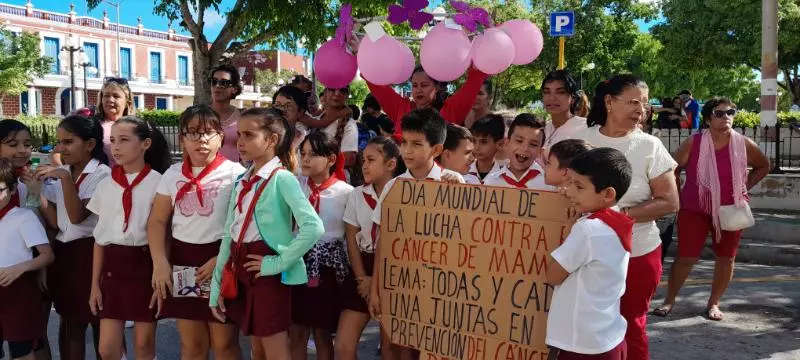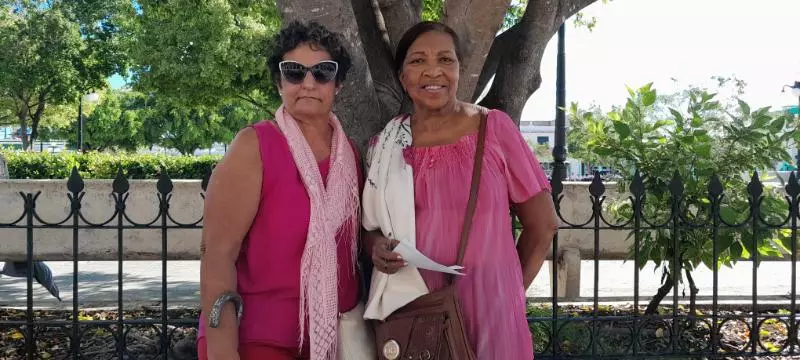Delsina Cocrent Rodríguez and Liliana Isabel Suárez Leyva are strong, warrior, everlasting women. Not everyone who has faced breast cancer has survived to tell the tale.
They have, and that’s why every October 19th, World Breast Cancer Awareness Day, they wear pink, in solidarity with those who have been diagnosed with this disease. In response to the need to curb the incidence of this cancer and prevent premature deaths from it. They share their story with the hope that it may inspire other women.
How did breast cancer come into your life?
Delsina: “It’s been 16 years. I remember going to a friend’s house, sitting on a scale, and leaning back. As a reaction, I put my hand on my breast and realized I had a lump there. Then, a friend quickly said, “But you have to go to the doctor.” And I did. I went to the doctor. Dr. Pedro Fernández Sarabia, a great mammologist, was still alive. When I took the test and brought him the results, he told me I had to have surgery and then undergo treatment.”
“Because I got nervous, like every human being, they took me to the psychologist, and when I was there, I told her I knew the process I was going through and I had to face it; I had no choice.
So, they gave me the treatment. They told me they were going to use conservative therapy. On May 26th, 2009, they removed the lump for evaluation. They did a cold biopsy, and it came back positive. And then they operated on me four days later. Then came the chemotherapy, and I handled it without any problems.”
Liliana: “I have a different story than Delsina. I’ve never touched anything. About three years ago, I was swimming and my breast simply started turning red, as if I’d been sunbathing at the beach. I talked to some friends to whom I owe a lot, as well as to my sister and my mother. They supported me, and I began this difficult process.”
“When the doctor saw me, he knew from the color of my breast and everything else what it was. They sent me for a test that’s done in the same appointment. They had to do it several times because it wasn’t giving results, but they were aware that it was.
When it came back positive, they put me through a process where they started me on IVs. Giving me four of the so-called red ones, those that cause the most physical deterioration, due to the discomfort they cause.”
“I’m a fairly strong woman. I’ve never had to stop them; they were administered every 21 days without any problems. After that, they gave me five more IVs, so-called white IVs. Then I had surgery, with a mastectomy from the start, and then they gave me six more IVs divided into two sessions every 15 days, followed by radiotherapy.”
“Sometimes people say that breast cancer isn’t the worst because it can be cured, and that’s true. But it’s a very exhausting process, not only for those who suffer from it but also for family and friends.”
What impact did the news of the diagnosis have on you and your family?
Delsina: “It was very difficult for me, which is why they took me to the psychologist, but I soon realized I had to face the process. The day I was in the pre-operative room, I met the young man who had sought me out to see a psychologist. He was a medical student, and this time he was a patient. He was in the room with me for thyroid surgery.
That gave me more strength to face the moment, seeing him so young and needing surgery. And everyone helped me: the doctor, the nurses, and I have a lot to thank my family and my friends for, who were, and continue to be, very kind. That has given me a lot of courage in life because I see I’m not alone.”
Liliana: “At first, I refused to believe it. I’ve always been a very active woman, and that paralyzed me. I couldn’t process or accept the news. I told myself I didn’t have it. But then I realized it was within me, that it can happen to you too. A diagnosis like this makes you grow, strengthens you, and teaches you to value life more.”

How does it feel to be a breast cancer survivor?
“I feel very well and grateful to the doctors, to life, and above all, to God and to everything that, in one way or another, has been present in my life to help me and to bring joy to my difficult moments.”
Liliana: “I’ve been post-op for two and a half years, I’m doing well, I have appointments every three or four months, and they’ve all come out well. I thank God first and foremost and so many people who taught me that life matters, for others and for yourself. Every minute counts.”
What do you recommend for women to detect breast cancer as early as possible?
–Delsina: “I tell all women to evaluate themselves when they bathe. When they go to bed, because everything can be remedied in time. I’ve been here for about 17 years and I’m healthy. I enjoy every moment and I tell everyone that when they have a situation, they should face it and think, “Tomorrow I’ll be better, and even if they don’t seem to have anyone to face life with, do it for themselves because it’s worth it.”
Liliana: “I tell women not to just get checked when they feel something. To pay attention to themselves because women often worry more about their family than themselves, and anyone can have cancer or any other illness that, if caught early, can have a more satisfactory outcome.”
How do you feel committed to this date each year, to join the Siemprevivas parade?
“I participate every year in the Siemprevivas parade. It’s a good time to see each other again.” We gather, we are happy, and we see how oncologists, psychologists, psychiatrists, and other public health professionals, the Federation of Cuban Women, and the new generations support us in this fight for life.”
This cancer has a devastating impact on personal, social, and economic levels. Since in most cases it doesn’t hurt. It’s there, self-examination is a very important action. More than 70 percent of breast cancers are detected by the women themselves. So we Holguin residents can do a lot to detect it early and be diagnosed.
In Holguin, an average of around 300 new cases are diagnosed each year. While no one wants to hear about breast cancer, it exists and affects hundreds of people. Although the exam alone doesn’t determine the presence of this cancer, it can be the starting point for seeking specialized help. It’s about going to the doctor to save time.
- The 4th edition of the Master’s Program in Natural Medicine will begin in Holguin - 16 de January de 2026
- Blood Bank Inaugurated at Holguin Military Hospital - 15 de January de 2026
- Holguin Cancer Center Plans to Incorporate Endoscopic Surgery in Urology - 14 de January de 2026

